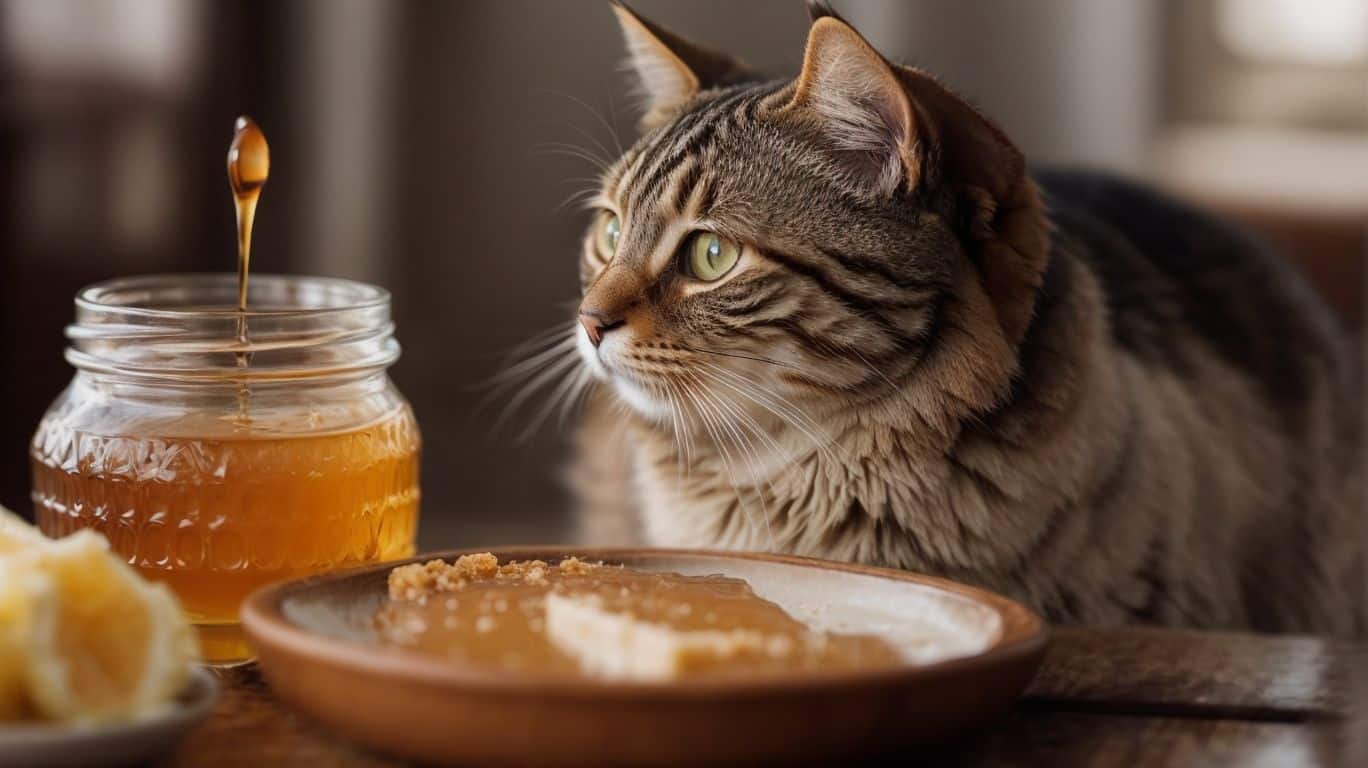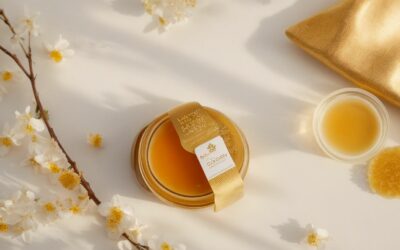Are you a cat owner looking for a natural and effective way to improve your feline’s health? Look no further than manuka honey.
This powerful and versatile honey has been gaining popularity for its health benefits for humans, but did you know it can also benefit your furry feline friend?
In this article, we will explore the uses and effectiveness of manuka honey for cats, so you can make an informed decision for your beloved pet’s well-being.
Is Manuka Honey Safe For Cats?
Is Manuka Honey Safe for Cats? While it is generally safe for felines, there are important considerations to keep in mind.
While it can have potential benefits such as supporting the immune system and promoting wound healing, it should be used with caution.
Some cats may have allergies or sensitivities to honey, so it is important to observe for any negative reactions.
Additionally, honey is high in sugar, so it should only be given in small amounts as a treat.
It is always recommended to consult with a veterinarian before introducing any new supplements or treatments to ensure the safety and well-being of your cat.
What Are the Benefits of Manuka Honey For Cats?
Manuka honey offers numerous benefits for cats, aiding in their overall health and well-being.
- Wound Healing: With its natural antibacterial properties, Manuka honey can effectively heal wounds, cuts, and scratches on cats.
- Digestive Health: When given in small amounts, it can support digestive health and alleviate gastrointestinal issues, such as constipation or diarrhea.
- Boosts Immunity: The antioxidants found in Manuka honey can boost a cat’s immune system, helping to prevent illness and fight off infections.
- Soothes Sore Throats: The honey’s soothing properties can provide relief for cats suffering from sore throats or coughs.
- Promotes Dental Health: Manuka honey’s antimicrobial properties can help reduce plaque and promote oral health in cats.
Pro-tip: Before using Manuka honey or any natural remedy for your cat, it is important to consult with your veterinarian to ensure it is safe and appropriate for your pet’s specific needs.
How to Use Manuka Honey For Cats?
To effectively use Manuka honey for cats, follow these simple steps:
- Consult with a veterinarian to ensure it is safe for your cat’s consumption.
- Select a high-quality, raw, and unprocessed Manuka honey with a high UMF rating.
- Begin with a small amount and gradually increase the dosage, following the veterinarian’s recommendations.
- Administer the honey orally by mixing it with your cat’s food or giving it directly.
- Monitor your cat for any potential adverse reactions or allergies.
Remember, it is important to only use Manuka honey as directed by a veterinarian. If you are unsure or your cat experiences any negative effects, discontinue use and seek professional advice.
Other alternatives such as coconut oil, aloe vera, chamomile, olive oil, or probiotics can also be beneficial for your cat’s health and well-being.
What Are the Potential Risks of Using Manuka Honey For Cats?
Using Manuka honey for cats can have potential risks and should be approached with caution.
While Manuka honey is known for its antibacterial properties and health benefits for humans, it may not have the same effects on cats.
Some potential risks of using Manuka honey for cats include:
- Allergic reactions: Cats may experience allergic reactions to honey or specific components in Manuka honey, resulting in skin rashes, itching, or digestive issues.
- High sugar content: Honey contains natural sugars that can contribute to weight gain, diabetes, or dental problems in cats.
- Botulism risk: Raw honey, including Manuka honey, may contain spores of Clostridium botulinum bacteria, which can cause botulism in cats.
It is always recommended to consult with a veterinarian before using Manuka honey or any alternative remedies for your cat, in order to ensure their safety and well-being.
How to Choose the Right Manuka Honey For Cats?
When selecting the perfect Manuka honey for cats, it’s crucial to take into account a few important factors to ensure its effectiveness and safety.
- Quality: Look for Manuka honey with a UMF (Unique Manuka Factor) rating of 10 or higher, as this indicates higher levels of beneficial compounds.
- Purity: Make sure that the honey is pure and does not contain any additives, such as sugars or artificial flavors.
- Origin: Opt for honey sourced from New Zealand, as this is where Manuka honey is primarily produced and renowned for its exceptional quality.
- Labeling: Check for proper labeling, including the UMF rating, batch number, and the name and contact information of the producer.
Pro-tip: It’s always a good idea to consult with a veterinarian before adding Manuka honey to your cat’s diet to ensure it’s suitable and safe for their specific health needs.
What Are the Alternatives to Manuka Honey For Cats?
While manuka honey may be a popular natural remedy for cats, it is not the only option available. In fact, there are several alternatives that can provide similar benefits for our feline friends.
Each of these alternatives offers unique properties and uses, making them valuable additions to our pet care routines.
In this section, we will discuss the top five alternatives to manuka honey for cats, including coconut oil, aloe vera, chamomile, olive oil, and probiotics. Let’s explore the diverse world of natural remedies for cats together.
1. Coconut Oil
Coconut oil is a well-known substitute for manuka honey when it comes to cats, as it offers a wide range of benefits. It can be applied topically to soothe dry skin, promote a shiny coat, and provide relief from any itching or irritations.
When consumed, coconut oil may also aid in maintaining digestive health and strengthening the immune system. Moreover, coconut oil contains lauric acid, which has antimicrobial properties.
To use coconut oil for cats, simply apply a small amount to their skin or mix it into their food. However, it is important to introduce coconut oil gradually and keep an eye out for any negative reactions.
2. Aloe Vera
Aloe vera can be a safe and natural alternative for cats. Here are steps to use aloe vera for cats:
- Choose a pure aloe vera gel or juice without any added chemicals or preservatives.
- Apply a small amount of aloe vera gel topically to soothe skin irritations or minor wounds.
- Monitor your cat for any adverse reactions and discontinue use if any occur.
- Consult with your veterinarian before using aloe vera internally as a supplement or for digestive issues.
Besides aloe vera, other alternatives for cats include coconut oil, chamomile, olive oil, and probiotics. Remember to always prioritize your cat’s health and consult with a veterinarian for proper guidance.
3. Chamomile
Chamomile is a natural remedy that can be beneficial for cats in certain situations. Here are some steps to use chamomile for cats:
- Brew a cup of chamomile tea using 1 teaspoon of dried chamomile flowers steeped in hot water for 5 minutes.
- Let the tea cool down completely before using.
- Place a few drops of the cooled chamomile tea on a clean cloth or cotton pad.
- Gently rub the chamomile-infused cloth on the cat’s fur or skin, focusing on areas of irritation or inflammation.
- Repeat this process a few times a day as needed.
True story: My friend’s cat, Whiskers, had a rash on his belly. She tried applying chamomile tea, and the inflammation reduced within a few days.
Whiskers seemed more comfortable and his fur started growing back. The chamomile cake worked wonders for him!
4. Olive Oil
Olive oil is a natural and safe substitute for Manuka honey when it comes to cats. It has multiple uses, including promoting healthier skin and coat, aiding digestion, and supporting joint health.
When selecting olive oil for your cat, it is best to choose extra-virgin or cold-pressed options to ensure the best quality.
Begin by adding a small amount to your cat’s meals and observe their response. As with any new supplement, it is crucial to consult with your veterinarian before incorporating olive oil into your cat’s diet.
Other alternatives to Manuka honey for cats include:
- Coconut oil
- Aloe vera
- Chamomile
- Probiotics
5. Probiotics
Probiotics are beneficial bacteria that can promote digestive health and support the immune system in cats. Incorporating probiotics into their diet can have several advantages.
Here are some steps to consider when using probiotics for cats:
- Choose high-quality probiotic supplements specifically formulated for cats.
- Consult with a veterinarian to determine the appropriate dosage for your cat’s specific needs.
- Gradually introduce probiotics into their diet to allow their digestive system to adjust.
- Monitor your cat’s response to probiotics to ensure they are tolerating them well.
- Remember to provide a balanced diet alongside probiotic supplementation for optimal health benefits.
Frequently Asked Questions
Does manuka honey really work for cats?
Yes, manuka honey has been found to have many health benefits for cats, including its ability to boost the immune system and aid in wound healing.
Is manuka honey safe for cats to consume?
Yes, manuka honey is safe for cats to consume in small amounts. However, it should not be given to cats with diabetes or those who are allergic to honey.
How can I use manuka honey for my cat?
Manuka honey can be given to cats orally, mixed with their food, or applied topically to wounds or skin irritations. Make sure to consult with your veterinarian for proper dosage and usage.
What makes manuka honey different from regular honey?
Manuka honey is made from the nectar of the manuka bush, which is known for its antibacterial properties. It contains a higher concentration of methylglyoxal, a compound that gives it its medicinal benefits.
Can manuka honey help with my cat’s digestive issues?
Yes, manuka honey has been found to have prebiotic properties that can promote good gut health and aid in digestion for cats.
Is manuka honey effective for treating respiratory infections in cats?
There is limited research on the effects of manuka honey on respiratory infections in cats, but its antibacterial properties may help in fighting off infections in the respiratory tract. It is recommended to consult with a veterinarian for proper treatment of respiratory infections in cats.
Is manuka honey safe for dogs?
Read our blog post on Manuka honey for dogs.
I’m a Manuka honey enthusiast and creator of Manuka Honey Organic, a blog where I share my journey with authentic Manuka honey from New Zealand. I want everyone to learn about the healing powers of Manuka honey.





